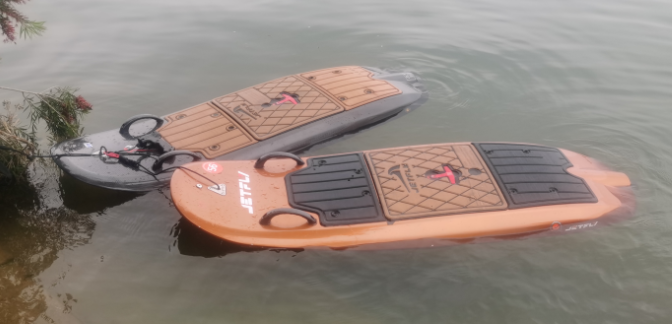How to charge a reasonable rental fee for electric hydro surfboards?
Jul 04,2024 | JetFly
Charging a reasonable rental fee for electric hydro surfboards involves considering several factors:

1. Cost of Equipment and Maintenance
Calculate the initial cost of purchasing the surfboards, as well as the ongoing costs for maintenance, repairs, and replacements. These expenses should be factored into the rental price to ensure the business is profitable.
Calculate the initial cost of purchasing the surfboards, as well as the ongoing costs for maintenance, repairs, and replacements. These expenses should be factored into the rental price to ensure the business is profitable.
2. Market Research
Look at what other similar rental businesses in your area or comparable locations are charging. This will give you an idea of the average price range that customers are willing to pay.
Look at what other similar rental businesses in your area or comparable locations are charging. This will give you an idea of the average price range that customers are willing to pay.
3. Rental Duration
Decide on different rental periods such as hourly, half-day, full-day, and weekly. Generally, longer rental periods should offer a discounted rate per hour to encourage customers to rent for longer.
Decide on different rental periods such as hourly, half-day, full-day, and weekly. Generally, longer rental periods should offer a discounted rate per hour to encourage customers to rent for longer.
4. Location and Demand
If you are in a high-demand tourist area or a location where there are limited rental options, you can charge a slightly higher fee. Conversely, in a more competitive market, you might need to be more price-sensitive.
If you are in a high-demand tourist area or a location where there are limited rental options, you can charge a slightly higher fee. Conversely, in a more competitive market, you might need to be more price-sensitive.
5. Seasonality
Adjust your prices based on the peak and off-peak seasons. During the busy summer months or holidays, you can increase the rates, while offering lower prices during the off-season to attract customers.
Adjust your prices based on the peak and off-peak seasons. During the busy summer months or holidays, you can increase the rates, while offering lower prices during the off-season to attract customers.
6. Add-On Services
If you provide additional services like safety equipment, instruction, or delivery, you can charge extra for these.
If you provide additional services like safety equipment, instruction, or delivery, you can charge extra for these.
For example, if the average cost of an electric hydro surfboard is $1,500 and it requires $500 per year for maintenance, and you expect to use it for 5 years before replacement, the total cost over its lifespan is $4,000. If you aim to rent it out for 500 hours over its lifespan, the cost per hour just to cover the equipment and maintenance would be $8. Based on market research, similar rentals in your area charge $15 per hour during peak season and $10 per hour during off-season. You might decide to charge $12 per hour during peak season and $8 per hour during off-season for an hourly rental. For a full-day rental (8 hours), you could offer a discounted rate of $80 during peak season and $50 during off-season.
Another approach could be to offer packages. For instance, a weekend package (two full days) could be priced at $150 during peak and $100 during off-season. A weekly package could be $500 in peak and $350 in off-season.
It's important to regularly review and adjust your rental fees based on changes in costs, market conditions, and customer feedback to ensure they remain reasonable and competitive.

